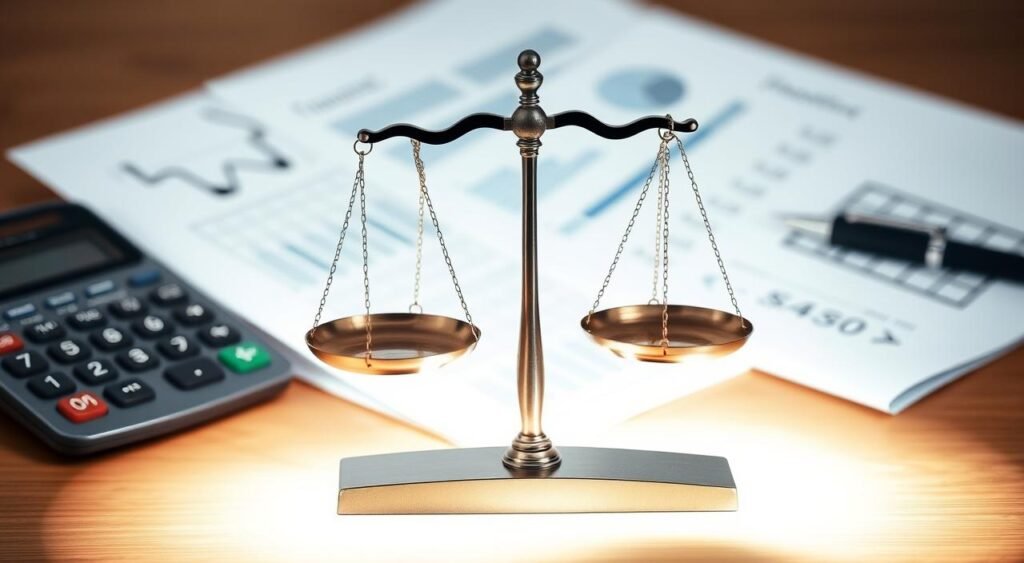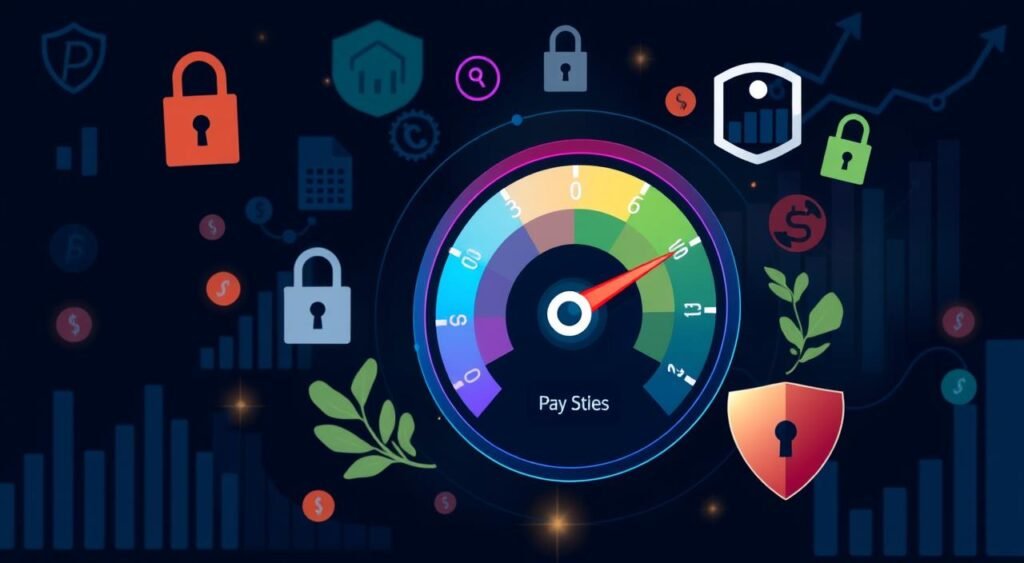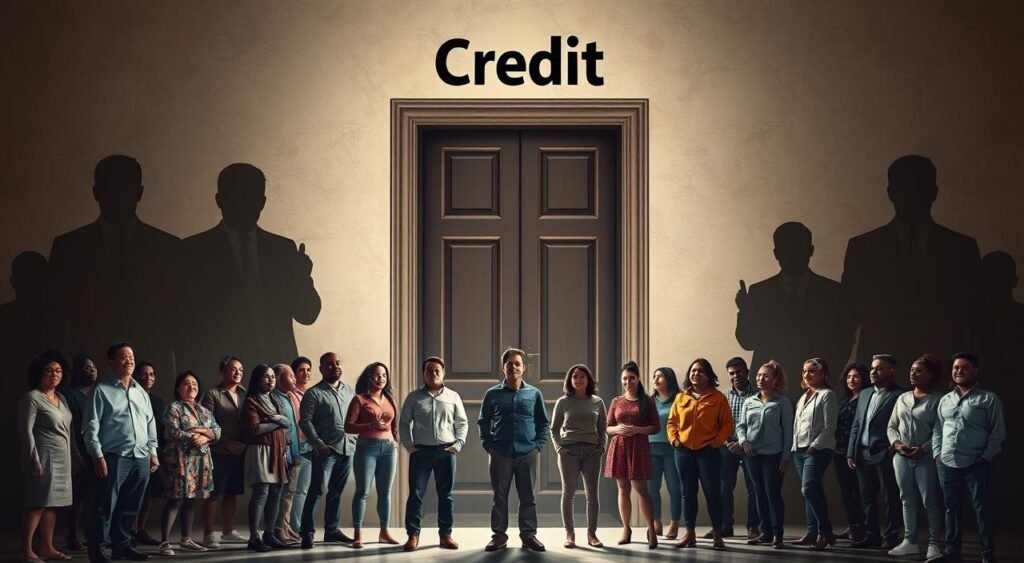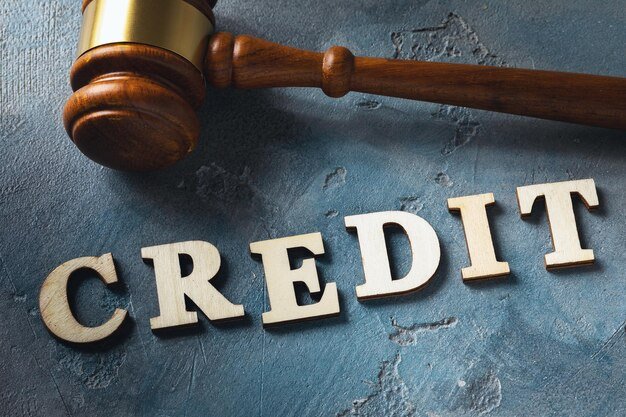How Do Credit Laws Protect Consumers?
A complex web of federal laws protects American consumers’ financial well-being. The Consumer Credit Protection Act (CCPA) of 1968 is at the center. It is enforced by agencies like the Federal Trade Commission (FTC) and the Consumer Financial Protection Bureau (CFPB). These laws ensure fair lending, prevent discrimination, and require clear loan terms.
The CCPA and its updates, like the Truth in Lending Act (TILA), protect consumers. They cover how credit data is collected and used. These laws also regulate debt collectors, giving people the right to their financial information.
Key Takeaways
- The Consumer Credit Protection Act (CCPA) is the cornerstone of federal consumer credit laws, regulating lending practices, credit reporting, and debt collection.
- The Truth in Lending Act (TILA) mandates lenders to disclose loan terms, including the annual percentage rate (APR) and potential fees, in clear and easy-to-understand language.
- The Fair Credit Reporting Act (FCRA) controls how credit reporting agencies collect, use, and share consumer credit information, giving individuals the right to access and dispute their credit reports.
- The Equal Credit Opportunity Act (ECOA) prohibits discrimination in credit applications based on factors like race, color, religion, national origin, sex, marital status, or age.
- The Fair Debt Collection Practices Act (FDCPA) aims to eliminate unfair and abusive debt collection practices, protecting consumers from harassment and deceptive tactics.
Understanding the Consumer Credit Protection Act (CCPA)
The Consumer Credit Protection Act (CCPA) was passed in 1968. It is a key law in the United States for protecting consumer credit. It has five main parts that help keep borrowers safe:
- The Truth in Lending Act makes lenders tell you important loan details like APR and total costs.
- The Fair Credit Reporting Act controls how credit info is collected, stored, and shared.
- The Equal Credit Opportunity Act stops lenders from unfairly judging applicants based on things like race or age.
- The Fair Debt Collection Practices Act limits what debt collectors can do and how often they can contact you.
- The Electronic Fund Transfer Act protects you in online transactions and limits your liability for lost cards.
Historical Development and Implementation
The CCPA has changed a lot over time to better protect consumers. Important updates include the Fair Credit Billing Act (1974) and the Credit CARD Act (2009). These changes have made credit reporting and billing disputes safer.
Scope of Consumer Protection
The CCPA covers many areas of consumer credit, like mortgages and credit cards. It requires lenders to be open, stops unfair practices, and sets rules for debt collectors. This helps consumers make smart choices and protect their money.
“The CCPA has evolved to provide comprehensive protection, regulating credit reports, preventing discrimination, establishing debt collection rules, and protecting electronic payments.”
The Truth in Lending Act and Consumer Rights

The Truth in Lending Act (TILA) of 1968 is a key law that helps keep the economy stable and protects consumers. It makes sure lenders give clear and honest info about loan terms. This includes the annual percentage rate (APR) and the total cost of borrowing. Over the years, TILA has been updated several times. These updates have made consumer protections stronger, like settling billing disputes and stopping unfair lending.
TILA requires lenders to share the APR and other important details early on. This helps consumers make better choices and compare costs. It also lets consumers cancel a deal within three days if they’re not happy with the terms. This gives them a chance to think things over.
TILA affects more than just credit cards and mortgages. It also covers auto loans and student loans. But, it doesn’t cover all kinds of credit deals, like business loans or student aid.
In the last 50 years, TILA has changed its rules to keep up with inflation and economic shifts. As of June 1, 2024, the amount of money it covers has gone up. Now, it covers more transactions, helping more people.
The Truth in Lending Act has been vital in making credit cards and home loans fairer. It has helped protect consumers for decades. Its impact is still felt today, helping people deal with lenders and creditors.
“The Truth in Lending Act changed federal policy from ‘let the buyer beware’ to ‘let the seller disclose.'”
Fair Credit Reporting Act: Safeguarding Consumer Information

The Fair Credit Reporting Act (FCRA) is a key law that protects people by controlling how their credit info is shared. It was made in 1970. It sets rules for credit bureaus and other groups that handle personal data.
Credit Report Access Rights
People can get their credit reports for free once a year from Equifax, Experian, and TransUnion. This lets them check their credit history for errors or fraud.
Dispute Resolution Process
The FCRA lets people challenge wrong or missing info on their reports. Credit bureaus must look into these disputes and fix any mistakes they find. This keeps credit info accurate and trustworthy.
Privacy Protection Measures
The FCRA limits who can see a person’s credit report. It’s only for real reasons like job, credit, or insurance checks. This keeps personal financial info safe from misuse.
It also helps identity theft victims by letting them put fraud alerts on their reports. Active-duty military get extra protection too.
The CFPB and FTC enforce the FCRA. They make sure credit bureaus and others follow the law.
The FCRA is vital for keeping consumer info safe. It helps people control their credit history. By knowing their rights and how to dispute errors, people can fight fraud and keep their credit fair.
Equal Credit Opportunity Act and Anti-Discrimination Measures

The Equal Credit Opportunity Act (ECOA) of 1974 is a key law. It stops lenders from discriminating based on things like sex, race, and religion. This law makes sure loans are given based on creditworthiness, not personal traits.
The National Credit Union Administration (NCUA) watches over smaller credit unions. The Consumer Finance Protection Bureau (CFPB) looks after bigger ones. ECOA stops unfair credit practices, like changing loan terms unfairly.
Creditors must treat married and unmarried applicants the same. They can’t use age to unfairly deny loans. Instead, age can be seen as a plus if it’s not a negative.
ECOA also fights against “redlining,” where lenders avoid certain areas. Credit unions must serve all areas they cover, especially those based on where members live.
The Department of Justice can sue under ECOA if there’s discrimination. The CFPB can enforce the law for big institutions. Banks like Citibank and Wells Fargo have faced big fines for unfair lending.
The Equal Credit Opportunity Act is a key protection. It makes sure everyone gets a fair shot at credit, no matter who they are. The ECOA helps make the financial world fairer for everyone.
Credit Laws and Debt Collection Regulations
The Fair Debt Collection Practices Act (FDCPA) is key in protecting consumers from unfair debt collection. It sets clear rules for debt collectors. It also protects people who owe debts, like credit card balances or medical bills.
Fair Debt Collection Practices
The FDCPA stops debt collectors from doing many things. They can’t call too early or too late, or call too much. They also can’t use scary language. They must give details about the debt, like who it’s from and how much is owed.
Consumer Rights During Collection
- People can question debts they don’t know about and ask for proof from collection agencies.
- Consumers can ask debt collectors to stop calling them by writing a letter.
- Debtors can say which debt their payments should go to when they have more than one.
Legal Limitations on Collectors
The FDCPA also limits what debt collectors can do. They can’t share debt info with just anyone. They must follow the law if they want to sue someone. They can’t take money from wages or bank accounts without a court order.
| Key Provisions of the FDCPA | Protections for Consumers |
|---|---|
| Prohibited Collection Practices | Limits on contact times, frequency, and harassment |
| Debt Verification Requirements | Debtors can dispute and request validation of debts |
| Restrictions on Sharing Debt Information | Collectors can only communicate with debtors, spouses, or attorneys |
| Legal Procedures for Debt Lawsuits | Debtors have the right to respond before collectors can sue |
| Limitations on Wage/Bank Account Garnishment | Collectors need a court order to garnish wages or accounts |
Knowing these credit laws and debt collection regulations helps consumers protect themselves. It lets them stand up for their rights when dealing with debt collectors.
Electronic Fund Transfer Protection and Digital Rights

The Electronic Fund Transfer Act (EFTA) of 1978 is key in protecting people who use digital transactions and online banking. It covers many types of electronic fund transfers, like ATM use, debit cards, and automatic bank withdrawals. The EFTA sets rules and protections, helping people feel safe while using consumer financial protection online.
The EFTA makes sure banks tell customers clearly about their services. People need to know about fees, what they’re liable for, and how to fix mistakes. This helps them make smart choices about their money.
The EFTA also limits how much people can lose if their debit card is stolen. This means people aren’t stuck with big losses from fraud. It’s a big help in today’s world of digital transactions.
It also lets people fix mistakes in their electronic fund transfers. Banks must quickly look into and fix issues like wrong charges or account errors. This helps keep people’s financial information safe and correct.
The electronic fund transfer act keeps getting updated, with the Consumer Financial Protection Bureau (CFPB) playing a big role. The EFTA stays a vital protection for those using digital transactions and online banking.
“The Electronic Fund Transfer Act has become increasingly important with the rise of digital banking and online financial transactions.”
Identity Theft Protection and Credit Security Measures

In today’s digital world, identity theft is a big problem. The Fair and Accurate Credit Transactions Act (FACTA) helps fight this by giving consumers tools to protect themselves. One key tool is the fraud alert on credit reports. It warns creditors of possible fraud, making it tough for thieves to open new accounts in your name.
FACTA also lets you get one free credit report annually from each major credit bureau. This helps you keep an eye on your credit and spot any odd activity. The law also offers extended fraud alerts and credit freezes. These can block access to your credit file, stopping more damage from identity theft.
Consumer Recovery Rights
The FACTA law also gives important consumer recovery rights to those whose identity has been stolen. If your identity is stolen, you can ask for details on fraudulent transactions. Creditors and businesses must give you this info to help you prove your case and fix your credit.
| Key Identity Theft Protection Measures | Benefits |
|---|---|
| Fraud Alerts | Notify creditors of potential fraud, making it harder for thieves to open new accounts. |
| Free Annual Credit Reports | Enable consumers to regularly monitor their credit and detect suspicious activity. |
| Extended Fraud Alerts and Credit Freezes | Restrict access to credit files, preventing further damage from identity theft. |
| Consumer Recovery Rights | Empower victims to obtain documentation and information to resolve identity theft issues. |
By using these identity theft protection and credit security measures, you can protect your financial health. These steps help you fight back against identity theft and recover from it.
Also Read: Credit Score Simulator: See Your Score Soar
Conclusion
The United States has strong laws to protect people’s financial rights. These laws include the Consumer Credit Protection Act (CCPA), the Fair Credit Reporting Act (FCRA), and the Equal Credit Opportunity Act. They make sure the credit system is fair and open to everyone.
These laws have grown with the financial world. Now, with more credit bureaus and scores, they help keep information safe. They also let people fix mistakes, keep their privacy, and get credit fairly.
As technology and finance change, these laws need to keep up. This will help everyone, make the credit system strong, and protect financial rights for all Americans.
FAQs
Q: What are credit rights and how do they protect consumers?
A: Credit rights refer to the legal protections and privileges consumers have regarding their credit information and credit accounts. These rights ensure that consumers are informed about their credit standing, have access to their consumer report, and can dispute inaccuracies in their credit records.
Q: How does the federal credit system impact consumers?
A: The federal credit system provides regulations that govern how credit is extended to consumers. It ensures that credit card companies and lenders adhere to fair practices when evaluating credit applications and reporting information to consumer reporting agencies.
Q: What should I do if a debt collector violates my credit rights?
A: If a debt collector violates your credit rights, you can file a complaint with the Consumer Financial Protection Bureau (CFPB) or your state’s attorney general. You may also want to seek legal advice to understand your options for recourse under the Fair Debt Collection Practices Act.
Q: What is the Credit Repair Organizations Act?
A: The Credit Repair Organizations Act (CROA) is a federal law that regulates credit repair organizations. It requires these organizations to provide consumers with written contracts, disclose their services clearly, and prohibits them from making misleading claims about improving one’s credit record.
Q: How can I obtain a copy of my credit report?
A: You can obtain a copy of your credit report for free once a year from each of the three major consumer reporting agencies—Equifax, Experian, and TransUnion—by visiting AnnualCreditReport.com. This allows you to review the information in your credit report for accuracy.
Q: What information can a consumer reporting agency provide to me?
A: A consumer reporting agency can provide you with information regarding your credit accounts, payment history, and outstanding debts. They collect and furnish information to a consumer, which helps lenders assess your creditworthiness when you apply for new credit.
Q: How do state laws affect my credit rights?
A: State laws can provide additional protections beyond federal credit laws. They may impose stricter regulations on debt collectors and credit reporting practices, enhancing your consumer rights and offering remedies if those rights are violated.
Q: What should I know about my credit card account and credit standing?
A: Knowing the terms and conditions of your credit card account is crucial. This includes understanding your payment due dates, interest rates, and how your payment history affects your overall credit standing, which is reflected in your consumer report.
Q: Can I dispute information in my credit report?
A: Yes, if you find inaccuracies in your credit report, you have the right to dispute that information. You should notify the consumer reporting agency and the furnisher of the information, who must then investigate the dispute and correct any errors as required by law.
Q: How do credit terms affect the extension of credit?
A: Credit terms, such as interest rates and repayment schedules, play a significant role in the extension of credit. Lenders evaluate these terms alongside your credit history to determine whether to approve your application for new credit and under what conditions.
Source Links
- https://www.capitalone.com/learn-grow/money-management/consumer-credit-protection-act/
- https://www.bankrate.com/personal-finance/credit/consumer-credit-protections-know-your-rights/
- https://www.investopedia.com/terms/c/consumer-credit-protection-act-of-1968.asp
- https://www.debt.org/credit/your-consumer-rights/the-consumer-protection-act/
- https://lawshelf.com/videocoursesmoduleview/the-truth-in-lending-act-and-the-equal-credit-opportunity-act–module-1-of-5—
- https://www.investopedia.com/terms/t/tila.asp
- https://www.consumerfinance.gov/rules-policy/final-rules/truth-lending-regulation-z-threshold-adjustments/
- https://files.consumerfinance.gov/f/documents/102012_cfpb_fair-credit-reporting-act-fcra_procedures.pdf
- https://www.protectmyministry.com/blog/the-fair-credit-reporting-act-and-you-protecting-your-credit-information/
- https://ncua.gov/regulation-supervision/letters-credit-unions-other-guidance/equal-credit-opportunity-act-nondiscrimination-requirements
- https://www.investopedia.com/terms/e/ecoa.asp
- https://www.consumerfinance.gov/ask-cfpb/what-laws-limit-what-debt-collectors-can-say-or-do-en-329/
- https://consumer.ftc.gov/articles/debt-collection-faqs
- https://www.fdic.gov/sites/default/files/2024-03/fil19009b.pdf
- https://www.federalreserve.gov/boarddocs/caletters/2008/0807/08-07_attachment.pdf
- https://www.attorneygeneral.gov/protect-yourself/identity-theft/identity-theft-preventative-measures-checklist/
- https://www.bankatsecurity.com/fraud-prevention.aspx
- https://www.ftc.gov/sites/default/files/attachments/training-materials/law_practice.pdf
- https://www.law.cornell.edu/uscode/text/15/1681
